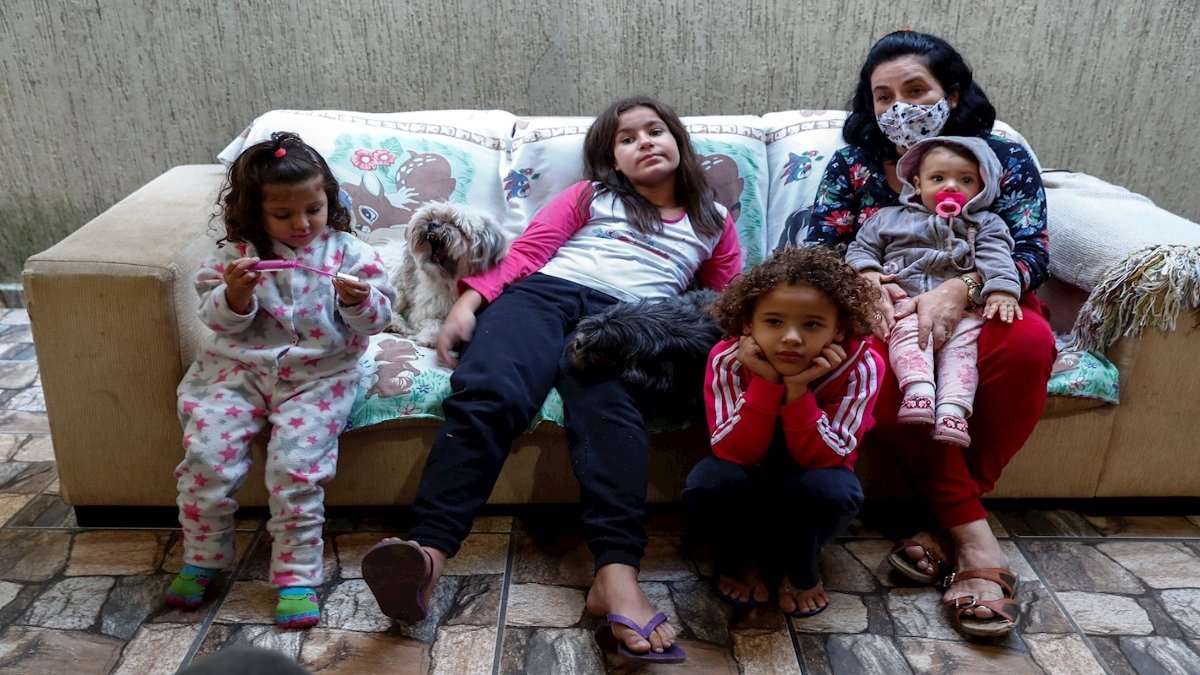RIO DE JANEIRO, BRAZIL – “In two weeks, I lost my father, my mother, and my grandfather.” The same story is repeated throughout Brazil: thousands of children without parents because of Covid-19. They are the orphans of the pandemic, victims of an invisible tragedy still unanswered by public agencies.
At least 45,000 children and adolescents have been left without both parents during the pandemic, according to preliminary estimates by Brazil’s Institute of Applied Economic Research (IPEA).

Julia, Valentina, and Heloísa are now in the care of their grandparents in the town of Jundiaí, in the interior of the state of São Paulo. They are six, three, and one year old.
Their mother died in March at the age of 26 from covid-19. She had no previous health problems. Their father abandoned them a few days after the fatal outcome, leaving for the state of Maranhão, 3,000 kilometers away. Since then, no message, no call. Nothing.
The grandparents then took care of their three granddaughters with just enough money in their pockets. Overnight they went from four to seven at home.
“I simply had to show up with a smile the next day and tell my granddaughters that everything is fine, that grandma is here,” Adriana del Rio explained to Efe with a lump in her throat.
The emotional and economic impact has been enormous. They had to move to accommodate everyone. The granddaughters suffer “moments of crisis” frequently. Their new guardians, too.
Heloísa, the youngest, smiles when she sees a picture of her mother on her cell phone. The grandmother crumples at the reaction of the little girl, still unaware of what happened. “It’s a pain that will never pass. Only God will teach me how to live with it,” she lamented.
A MOTHERS’ PROJECT TO SAVE ORPHANS
Del Rio found support to move forward through a project promoted by three mothers from Jundiaí that hundreds of people have joined. The initiative, “Mothers who welcome”, has already given shelter to 25 minors. But they can’t keep up.
“This last week was terrible because 19 minors arrived from five mothers who died,” lawyer Renata Paschoalini, one of the founders of the project, providing economic and psychological assistance to the orphans through donations and volunteers, told Efe.
The idea was born after learning about Ryan Lucatto, 20, and his brother, 10. In just two weeks, they lost their father, mother, and grandfather, all victims of Covid-19.
Their father, a delivery driver, was the first to be admitted to the hospital. His mother, who worked as a maid, followed shortly after. Neither of them was over 45 years old. Neither was able to stop working. Neither survived. In between, his grandfather died.
“The first question my brother asked me was, ‘Did dad and mom suffer?’ I told him, as far as I knew and knpw, no because they were both intubated. And there he asked me, ‘will we ever find them in heaven?’ I think so, I told him. Those are the only two questions he asked me,” she recalled.
Lucatto confessed that at first, he did not take the virus very seriously. He thought it was a “gripezinha,” a term popularized by President Jair Bolsonaro meaning “the sniffles”.
NO GOVERNMENT RESPONSE
Meanwhile, the numbers continue to grow. Every day some 2,000 people die of the disease. There are already 450,000 in total. Fifteen months after the first contagion, Congress has begun to discuss a bill to grant a pension to Covid-19 orphans, as Peru did.
The measure is vital since many of the parents of these minors worked informally and, therefore, a priori, do not have access to the orphan’s pensions available to regularly employed workers under Brazil’s labor code.
Glauce Galúcio, director of the Research and Teaching Institute for Sustainable Development in Amazonas, one of the Brazilian states most affected by the virus, participates in these discussions.
She also launched a solidarity campaign similar to the one in Jundiaí, called “I love my neighbor”. Since January, they have helped 160 orphans who face the trauma in different ways.
Some go into shock, others lock themselves in their rooms and do not want to talk to anyone. Some express their sadness aggressively or in tears, according to the educator.
“Orphans are not going to cease to exist. The lack of beds can be solved by building a field hospital, but the covid orphans are an endemic problem. It is up to us, as a society, to do something for these children,” she said.

